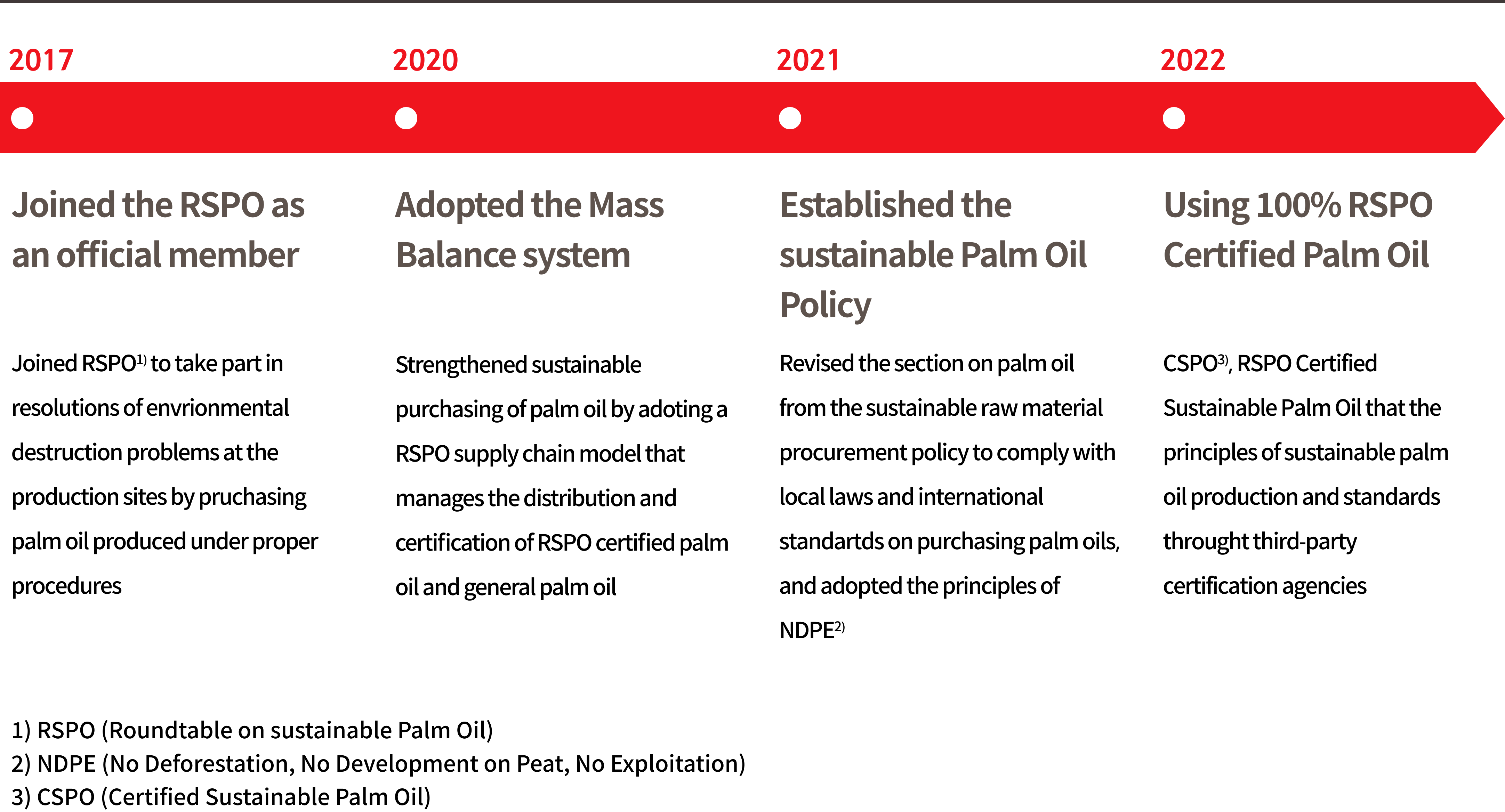Our Approach
Global warming, abnormal climate, and environmental pollution have already become familiar dangers and realities. Response to climate change is now a social challenge that must be overcome through joint cooperation regardless of government, industry, or individuals. CJ CheilJedang declared Carbon Neutral & Zero Waste for 2050, and is going after sustainable businesses and investments for the future to turn a crisis into an opportunity. We aim to not only pursue business activities for carbon neutrality but also introduce eco-friendly products and technologies that can contribute to carbon neutrality through innovative technology that can be applied by each product unit.
Sustainable Environmental Management Strategy System
Set Goals for
2030
We have established goals for Carbon Neutral & Zero Waste and are pursuing detailed implementation plans. The challenges that we have established include reducing GHG emissions by 25%, reducing food loss and waste by 50%, and from the customers’ perspective, contributing to 25% or more of customers’ GHG emissions reduction based on our products and solutions by 2030 compared to 2020. We have set goals to reduce our environmental impact and are working to continuously improve our environmental performance, and we hope to continue to discover and practice better ways to achieve our carbon-neutral goals.
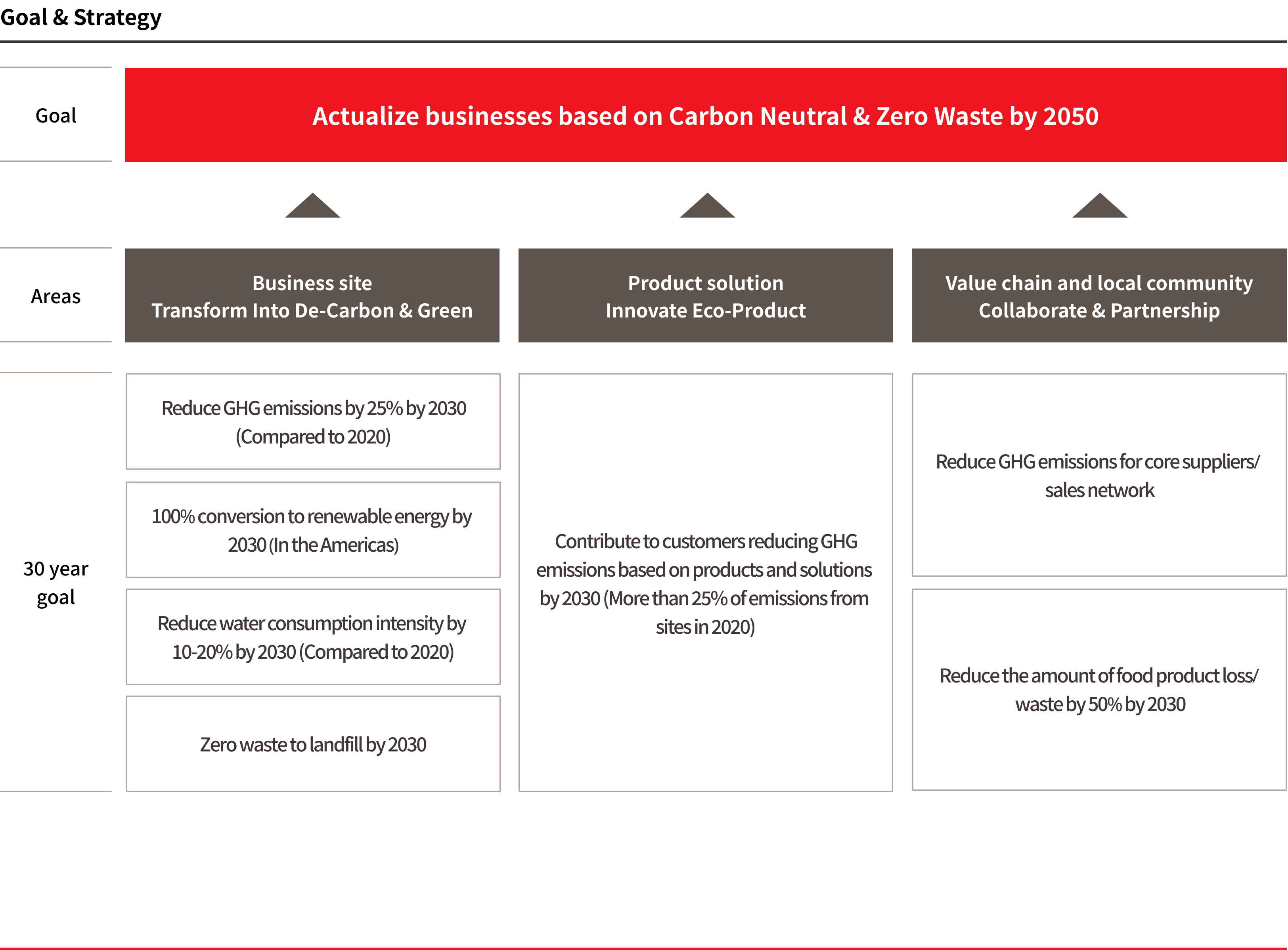
Pursuing
Sustainable
Environmental Management
CJ CheilJedang set the "2050 Carbon-Neutral and Zero Waste Business" goal and defined detailed targets for 2030 to minimize negative environmental impacts across all areas of its business sites. These involve corporate-wide innovation ranging from reducing GHG emissions, increasing water efficiency, zeroing waste to landfill, contributing to customer GHG reductions with our products and solutions, the product and solution areas, and minimizing emissions across the value chain from sourcing to sales and disposal. In addition, we have established a 'performance evaluation system' that assigns environmental management goals to KPIs to promote task execution. We are also implementing an internal carbon pricing system and an innovation performance reward program. Our company plans to form a corporate TF (Task Force) that encompasses the entire value chain to drive the execution of tasks and achieve our goals.
Environmental Management System
CJ CheilJedang has sustainability governance to accelerate the establishment and implementation of sustainable environmental strategies. The Corporate Sustainability Committee under the Board of Directors is the highest decision-making body that deliberates and makes decisions on environmental management issues, including climate change response. Items to be presented to the committee undergo preliminary discussions at the Corporate Sustainability Council, which consists of the CEO, top executives of each business division, and the head of the ESG organization. As an organization dedicated to corporate-wide climate change response and sustainable environmental management, the ESG Center regularly identifies laws and regulations related to environmental management, establishes, and implements corporate-wide environmental management strategies including risk identification and analysis, and takes responsibility for effective collaboration and internal and external communication with ESG departments and working- level organizations. In 2022, we assigned key performance indicators (KPIs) related to climate change response to the organization responsible for environmental projects as one of CJ CheilJedang's ESG management goals.
Environmental Management Supervision
CJ CheilJedang has environmental strategies for each step of environmental management, from environmental risk identification to improvement, prevention, response, and diagnosis, ensuring a proactive response to environmental impacts. To this end, we are expanding environmental management system certification for organized environmental management at our domestic and overseas sites. As of 2022, 18% of our sites have obtained ISO 14001 environmental management system certification. To promote global environmental management, the BIO Business disseminated the Global ESG Checklist Guidelines to all sites and strengthened the monitoring of GHG emissions at overseas sites in 2022. As part of its efforts to analyze environmental risks, the Food Business conducted flood and wind risk diagnosis at its Incheon and Busan sites and analyzed the impact of climate change on their sites.
Response to climate change
Business site
Transform into De-carbon & Green
Renewable Energy Certificate (REC) Purchase Agreement
To reduce GHG emissions from our Jombang and Pasuruan operations in Indonesia, we signed the REC purchase agreement with the Indonesian power company PLN. Under the REC scheme, producers of geothermal and hydroelectric power seek zero emission certification from internationally accredited certification bodies and are allowed to sell the carbon credits by adding up certain amounts to the existing tariffs. Through this REC purchase agreement, we reduced 147,000 tCO2eq of GHG emissions and had them verified by a third party. In 2023, we anticipate 356,000 tCO2eq of reductions.
Introducing Solar Energy
CJ CheilJedang pursues innovation in the energy consumption structure by installing more solar facilities. In 2022, we completed the construction of power facilities in the Incheon 2site, which are in full-scale operations now. Our overseas operations in Vung Tau, Vietnam, and Kerteh, Malaysia have introduced and commissioned solar facilities. In 2023, we plan to expand the solar facilities in the Jincheon, Incheon 1, Jincheon BC, and Jombang in Indonesia.
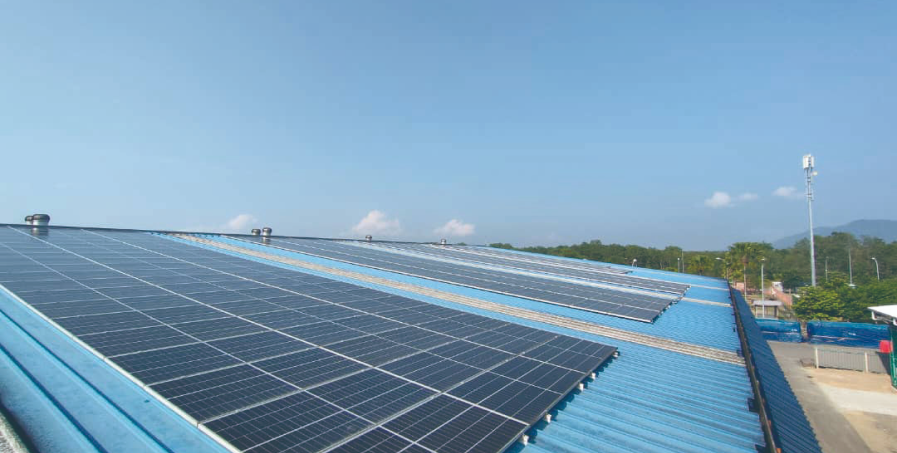
Zero Waste to Landfill from Our Sites
Aspiring to achieve zero waste to landfill by 2030, CJ CheilJedang strives to reuse, recycle and recover energy from waste generated from our Production sites. Our domestic food Production sites have already reached zero waste to landfill by using wastes as industrial feedstock, agricultural feed, or compost, and we are working to have more sites obtain the zero waste to landfill certification. Now we plan to disseminate the best practices of our domestic site first to sites in China, the United States, and Vietnam where a large amount of waste is generated and disposed of, and then to all our global site.

Product solution
Innovate Eco-Product
Establishing Guidelines for Product LCA
CJ CheilJedang has established a foundation for LCA, a quantitative analysis of the environmental impacts of a product across its lifecycle from raw materials sourcing to production, distribution, and disposal. Aiming to identify potential environmental impacts based on input/output data considering the mass balance, we selected target products that are key strategic products in each business division considering measurability and scalability. We have also conducted pilot assessments and established LCA guidelines in accordance with ISO 14044 (Life cycle assessment) and ISO 14067 (Carbon footprint of products). Moving forward, we aim to accelerate the implementation of climate change response through education to help employees understand the LCA guidelines and apply them to their work.
Expanding the product lineup for sustainability
L-MET eco for GHG reductions
As the first product in the eco line, L-MET eco sets new standards for amino acids by offering increased bioavailability and cost reduction benefits. Optimized fermentation and refining processes help reduce emissions and shorten the time to slaughter weight, thereby reducing feed consumption.
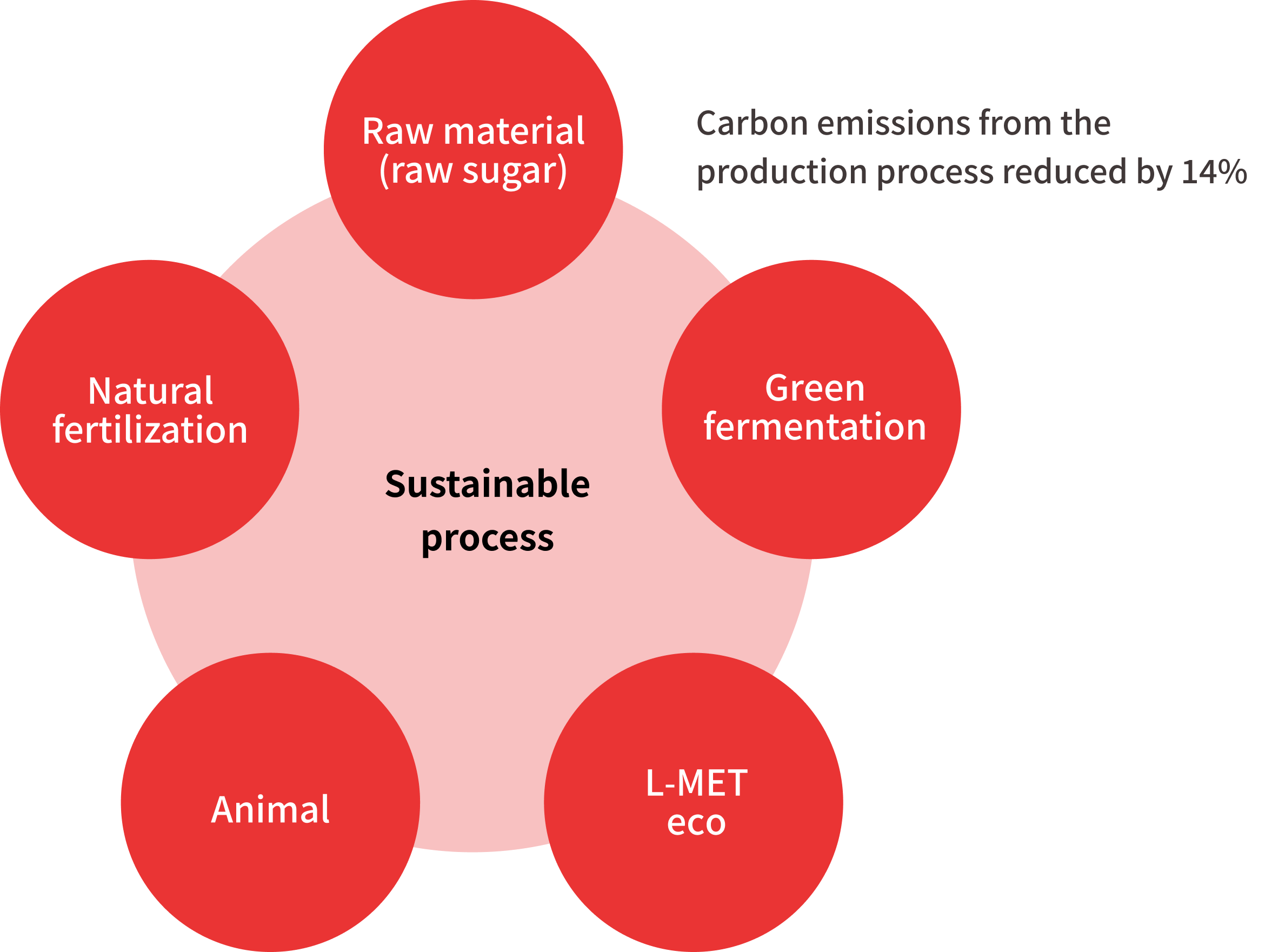
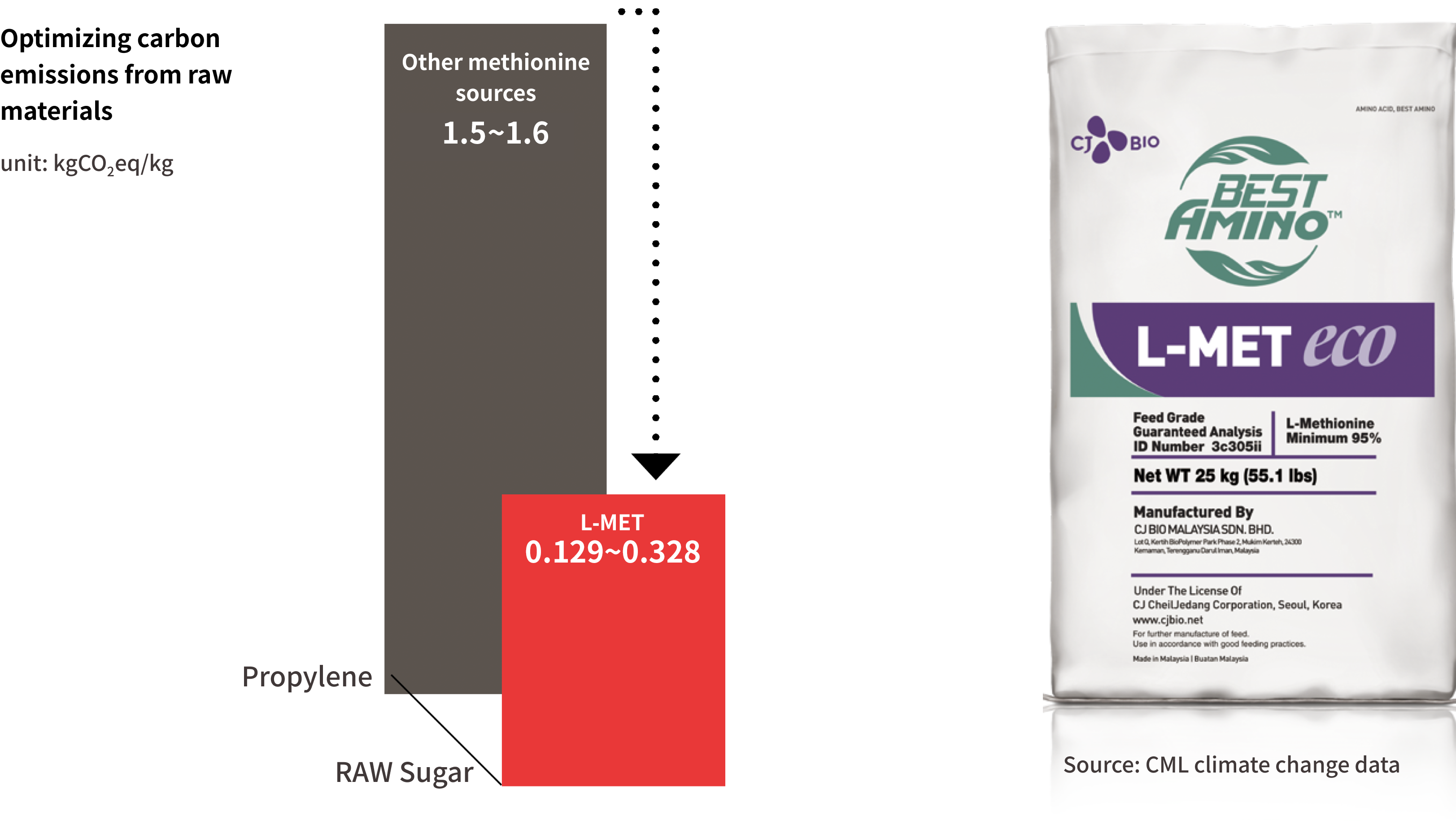
Amino Acid Solutions, E-balanced Diet Campaign
The E-balanced Diet Campaign aims to provide solutions that are eco-friendly (reduced nitrogen and carbon), economical (replacing grain protein) and efficient (using amino acids to improve the quality and quantity of livestock and meat). We utilize our microbial fermentation technologies and state-of-the-art bio production processes to produce eight key amino acids for feed. We provide tailor-made solutions to improve feed efficiency by increasing digestibility and contribute to a sustainable environment by reducing nitrogen compounds in manure.
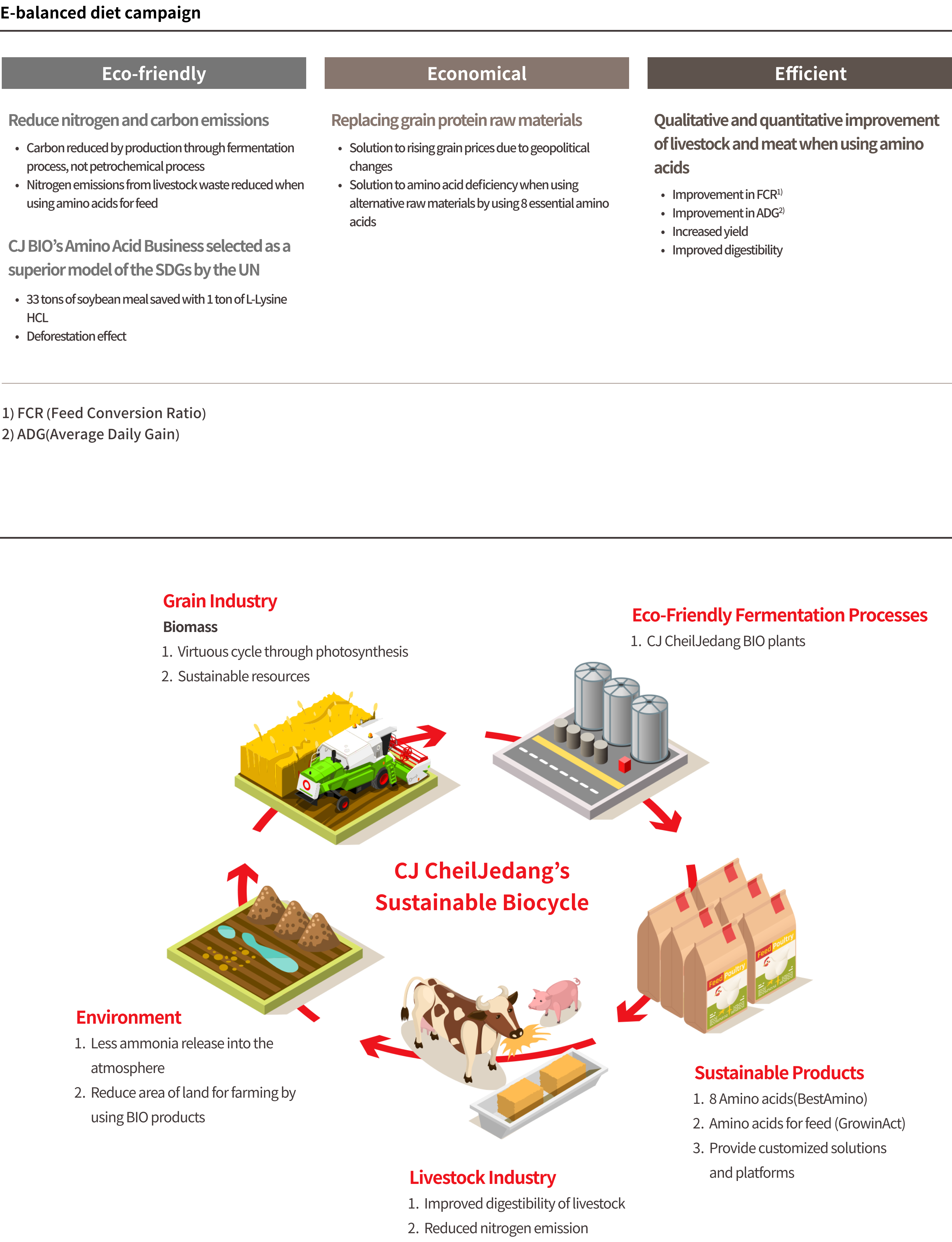

Food Upcycling Products; Excycle Basak Chip
The Excycle Basak Chip is made by upcycling broken rice from Hetbahn and residual bean curd from the Happy Bean Tofu. To make it even more eco-friendly, we utilize upcycled PET film (postconsumer recycled PET) certified by the Global Recycled Standard (GRS) for the packaging. We've replaced wheat flour with rice and bean curd remnants, which allowed our products to contain 7g of protein and 4g of fiber. Moreover, these chips are puffed rather than fried to provide consumers with more health and nutritional value. We plan to develop more products that leverage byproducts to minimize food loss and waste while promoting resource circulation.
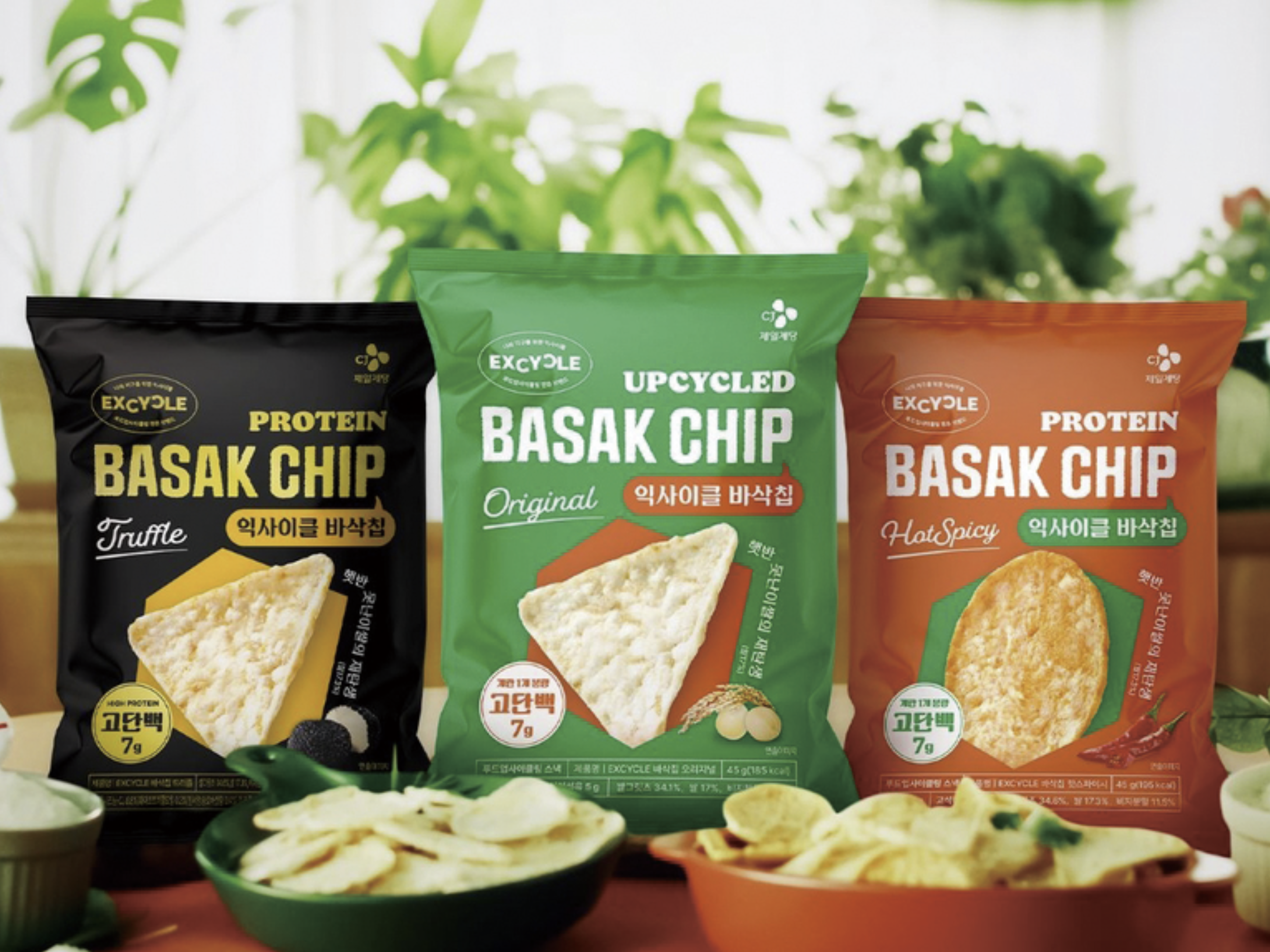
Brand for 100% plant-based products
PlanTable brand offers sustainable food products that substitute plant-based ingredients like soybeans for meat, aiming to reduce GHG emissions and environmental pollution caused by animal farming. In December 2021, we launched two PlanTable Mandu products (launched three export-only Mandu) made with 100% plant-based ingredients such as textured vegetable protein and vegetable oil. In 2022, we further expanded the PlanTable brand portfolio which includes Tteokgalbi, rice balls, hamburg steak, and grain bowls to meet diverse consumer preferences. PlanTable achieved 3 million units in sales within just 10 months, and we aim to reach KRW 200 billion in sales by 2025.

ALTIVE: Alternative plant-based High-Protein milk
ALTIVE is our plant-based, high-protein alternative milk brand. It was initially introduced as a prototype in June 2022 and later officially launched in December of the same year. The name "ALTIVE" derives from "alternative" and reflects our commitment to providing a superior dairy alternative that benefits both people and the planet. Made with our proprietary blend of brown rice and pea protein, ALTIVE milk contains eight essential amino acids similar to milk protein and has 1.5 times more plant protein than regular milk (9g per 200ml) and 1.7 times more calcium (374mg per 200ml), making it not only eco-friendly but also nutritionally beneficial. We plan to develop and launch new products that provide excellent plant-based alternatives to conventional dairy items.

Leading the cultured meat market to sustain the future of humanity
CJ CheilJedang has established a portfolio of food-grade amino acids and a microbial mass fermentation technology platform to develop and commercialize innovative cultured meat media. Cultured meat is a good option to mitigate ecosystem damage, reduce carbon emissions and minimize food resource waste from conventional animal farming. However, the production process currently involves the use of costly animal serum, making it crucial to develop eco-friendly alternative media for efficient mass production and enhanced cost competitiveness. In February 2022, we signed a memorandum of understanding with KCell Biosciences, the largest cell culture media producer in South Korea which has the second-largest production capacity in the Asia-Pacific region, with the aim to develop media that will give us a competitive edge in cultured meat mass production.
Value chain and local community
Collaborate & Partnership
Building a Foundation for Value Chain Measurement
To build a foundation for GHG management and reduction that encompasses the value chain (Scope 3), in addition to reductions from our operations, we identified priorities based on the proportion and significance of category-specific Scope 3 emissions, which we used to calculate Scope 3 emissions across the value chain, from product and service purchases to upstream and downstream transportation, logistics, post-consumer product disposal, waste disposal at business sites, and other energy-related carbon-emitting activities. All relevant departments, including purchase SCM, environment, and ESG, held more than ten online and offline meetings and workshops to define the scope of estimation, collect activity data, and develop guidelines for estimation and a Microsoft Excel spreadsheet tool. These served as the basis for our R-C-O Framework for achieving carbon neutrality in our products. Moving forward, we plan to expand category-specific coverage and establish and communicate detailed targets and strategies.

Sustainable Sourcing
Efforts for
‘Sustainable
Soybeans’
CJ CheilJedang is practicing sustainable sourcing through various projects to minimize environmental impact such as deforestation, which can occur during the soybean cultivating process around the world.
Expanding operation of CJ Selecta, Amazon Biome Free
In accordance with our declaration to ‘Deforestation-free,’ CJ Selecta executes the ‘Seed Project’ with the goal to expand the purchase of non-Amazon Biome soybeans and to purchase soybeans outside of the Amazon Biome in the Minas Gerais region of Brazil. With the ‘Seed Project,’ we have formed a partnership with major manufacturers of concentrated soybean protein in Brazil. With this we are securing and operating a mutual growth system where we supply farmers outside of Amazon with seeds, provide support for funds, and purchase cultivated soybeans.

Deforestation-free
In order to prevent the destruction of the ecosystem caused by deforestation or slash-and-burn cultivation, we do not source soybeans from such regions and instead strive to use soybeans procured in sustainable methods and try to expand the percentage of sustainably procured soybeans. Our Non-GMO soybeans are certified by Pro-Terra(a global standard certificate that requires sustainability and traceability based on compliance with 10 principles, such as legal compliance, respect for human rights, biodiversity conservation, environmental policies, waste policy, and non-use of GMOs), and we are working to build a framework to acquire the same certification for our GMO soybeans.
Biodiversity Policy
In Brazil, the largest producer of plant-based high-protein soybeans, there has been cases of forest damage because economic benefits were prioritized over forest protection. Therefore, biodiversity issues occurred. As a response to this, CJ CheilJedang has made a declaration for ‘Deforestation-free’ in 2021 as an effort to preserve a sustainable environment. In accordance with the Biodiversity Policy, we will strive to prevent and mitigate any negative impact on biodiversity that may arise in our business.
Efforts for
‘Sustainable
Palm Oil’
Palm oil derived from palm trees is highly productive and economical, and is being commonly used in food, cosmetics, cleaning agents, and as a raw material for BIO energy. However, the surge in palm oil consumption has led to an indiscriminate rise of palm oil production facilities. As a result, several environmental problems were induced including forest devastation, biodiversity loss, air pollution through shifting cultivation, as well as social problems such as violations of housing rights of the indigenous people and other human rights violations.
Sustainable Palm Oil Policy
The solution to the palm oil problems is to make a conscious effort to use palm oil that does not result in deforestation. In 2021, CJ CheilJedang established the ‘Sustainable Palm Oil Policy’ to minimize the negative impact on the environment and society caused by palm oil production and consumption, and to produce and sell sustainable palm oil. In addition, beginning in 2022, we are only using eco-friendly palm oil that has been certified through RSPO(Roundtable on Sustainable Palm Oil) for B2B (business-to-business) transactions. Starting with our domestic business sites, we plan to expand this movement to our overseas subsidiaries and suppliers.
